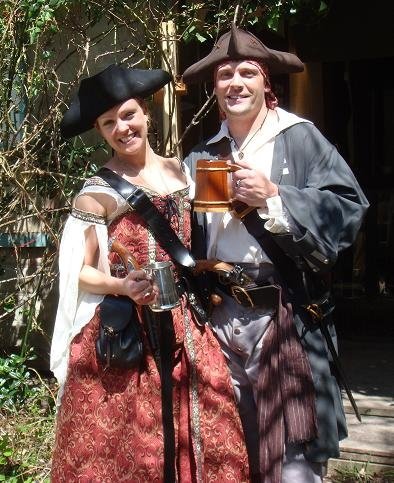
| Did "pirates" of the 17th - 18th centuries carry sabers as a side arm? | ||||||||||||||
|
||||||||||||||
| Total Votes : 25 | ||||||||||||||
Since International Talk Like a Pirate Day is quickly approaching I thought we might change our centuries up a bit. Now we all know that people typically think of "pirates" as the 17th to 18th century portrayals, commonly, but what about the viking era? There are many early pirates and even some pirates of recent. So let us see YOUR pirate! :cool:
 Attachment: 59.64 KB
Attachment: 59.64 KB


Last edited by Troy G L Williams on Wed 09 Sep, 2009 12:08 pm; edited 2 times in total
Pirates carried all kinds of swords, there was no standard issue. They certainly used hangers which are a variation of a saber.
Are the majority of hangers shorter than an average sabre? Sorry, spelled "sabre" wrong initially. Oops. Another question would be the rapier. It seems the rapier would not be the weapon of choice because of the length. There is not a lot of room on a ship for combat with a rapier or a similar sword, correct? :?:
Saber should only be sabre if rapier is going to be rapire.
M.
M.
We tend to think of pirates as being scruffy ruffians on the fringes of society, but there were also privateers, pillaging the merchant ships of the enemy, who were part of the nobility. One excellent example (who is very relevant to this website) is George Clifford, 3rd Earl of Cumberland. He was famed for his exploits in the Carribean, wreaking havoc on Spanish shipping and briefly capturing the fort at San Juan, Puerto Rico. You can call him a privateer, buccaneer or pirate, but the man had class:
[ Linked Image ]
He was appointed Queen's Champion after the retirement of Sir Henry Lee, and his Greenwich armour survives today as one of the finest examples of English garniture in existence.
[ Linked Image ]
The armour of a pirate!
[ Linked Image ]
He was appointed Queen's Champion after the retirement of Sir Henry Lee, and his Greenwich armour survives today as one of the finest examples of English garniture in existence.
[ Linked Image ]
The armour of a pirate!
| M. Eversberg II wrote: |
| Saber should only be sabre if rapier is going to be rapire. |
Well in French it's "sabre" and "rapière" for what is worth...
Well, according to Wikipedia http://en.wikipedia.org/wiki/Sabre it may be spelled either way. So, nobody is wrong. :D
It is true that in the early days pirates (privateers) were authorized to conduct raids and attacks by their governing country. If I remember correctly politics created the actual act of piracy that forced privateers to do business for themselves to keep to what they knew best. Correct me if I am wrong.
It is true that in the early days pirates (privateers) were authorized to conduct raids and attacks by their governing country. If I remember correctly politics created the actual act of piracy that forced privateers to do business for themselves to keep to what they knew best. Correct me if I am wrong.
| Troy G L Williams wrote: |
| Are the majority of hangers shorter than an average sabre? Sorry, spelled "sabre" wrong initially. Oops. Another question would be the rapier. It seems the rapier would not be the weapon of choice because of the length. There is not a lot of room on a ship for combat with a rapier or a similar sword, correct? :?: |
I've read that a lot of pirates- even the ones that were not privateers- aspired to be "gentlemen of fortune", so it's not implausible that they would sometimes wear a rapier along with other fine items. Especially on shore, when they could show off the wealth they'd taken to attract potential recruits and women.
Thanks Dan, that does seem very plausible. Most sailors aboard ship in those days would not wear socks and shoes so they could get a better grip on deck and so on, from what I have read. I would imagine that once on shore they may actually wear shoes and their finest attire, depending upon their station of course.
| Troy G L Williams wrote: |
| Thanks Dan, that does seem very plausible. Most sailors aboard ship in those days would not wear socks and shoes so they could get a better grip on deck and so on, from what I have read. I would imagine that once on shore they may actually wear shoes and their finest attire, depending upon their station of course. |
But then there are always the officer types or rich successful pirates or a pirate with a military or noble background trained in the use of the " rapière " ( in French ).
Some pirate privateers where in fact in charge of more than one ship and have a virtual fleet of ships at their disposal. ( Closer to mercenary captain of the sea rather than a poor sailor turned pirate ).
I think captain Morgan would qualify: http://en.wikipedia.org/wiki/Henry_Morgan
Classic pirate film worth seeing: http://en.wikipedia.org/wiki/The_Black_Swan_(film)
Page 1 of 1
You cannot post new topics in this forumYou cannot reply to topics in this forum
You cannot edit your posts in this forum
You cannot delete your posts in this forum
You cannot vote in polls in this forum
You cannot attach files in this forum
You can download files in this forum
All contents © Copyright 2003-2006 myArmoury.com — All rights reserved
Discussion forums powered by phpBB © The phpBB Group
Switch to the Full-featured Version of the forum
Discussion forums powered by phpBB © The phpBB Group
Switch to the Full-featured Version of the forum